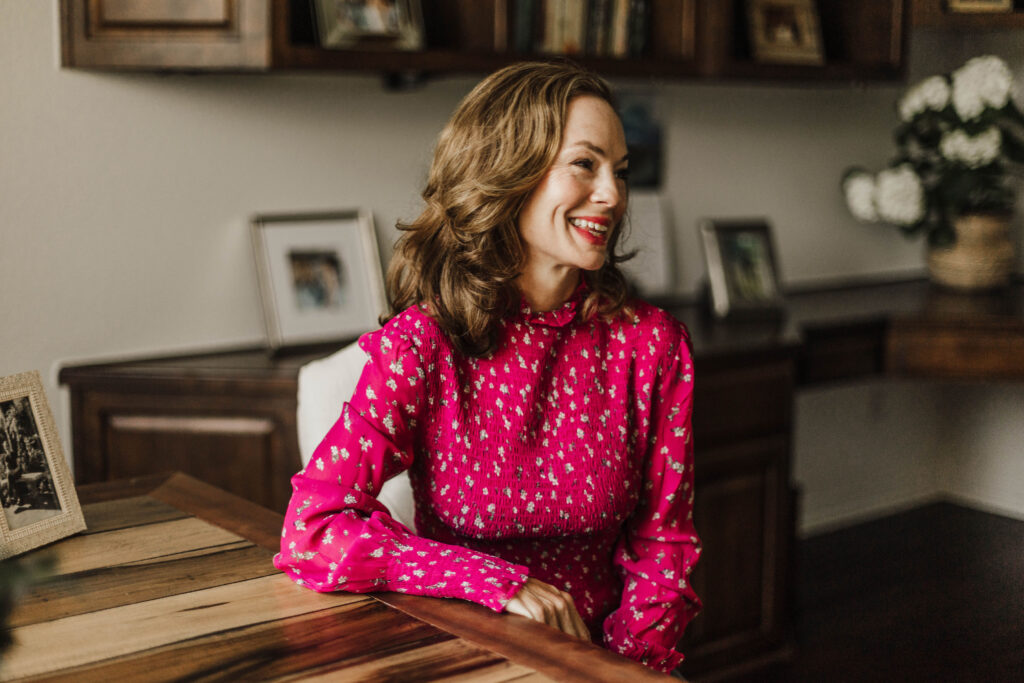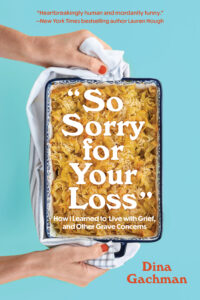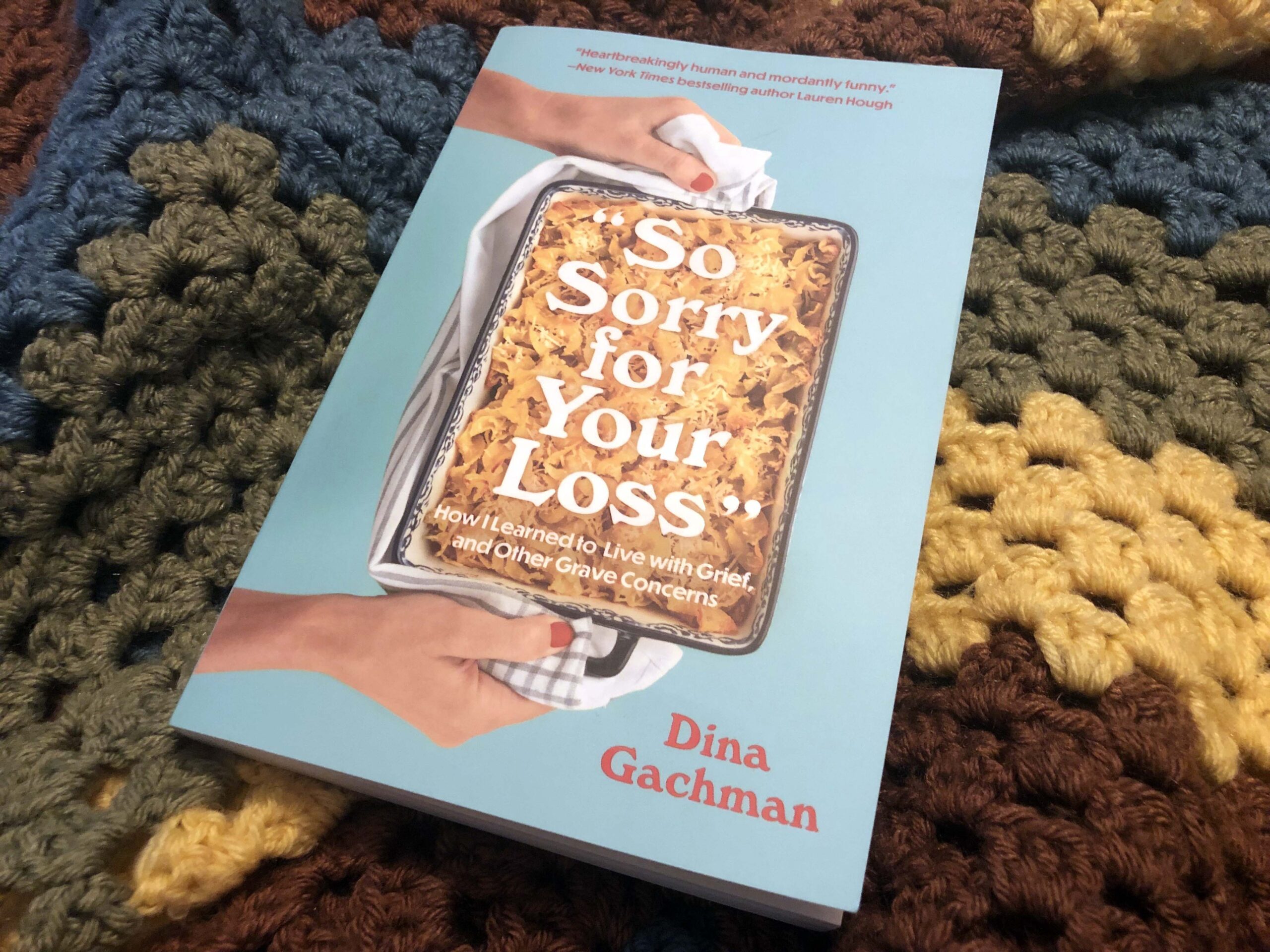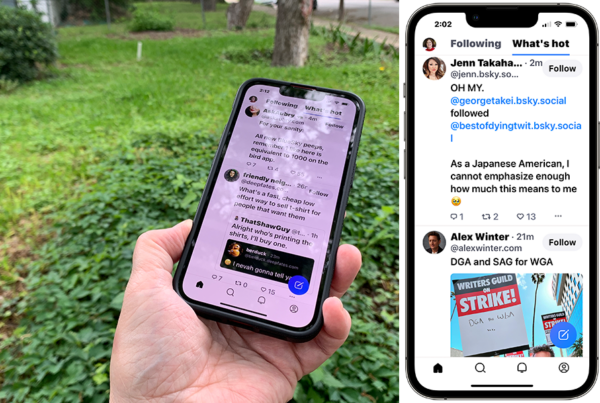Grief is a deeply personal experience and yet universal: Dealing with tragedy in whatever form is part of life.
And after losing her mother to cancer and sister to alcoholism just a few years apart, Texas author Dina Gachman dealt with grief head-on. Through humor and candor she explores mourning in her latest book “So Sorry For Your Loss: How I Learned to Live with Grief, and Other Grave Concerns.”
This transcript has been edited lightly for clarity:
Texas Standard: First of all, I guess I should say I’m so sorry for your loss – not just talking about the book title here, but the loss of your mom and your sister. You actually write in your book about the words we use to those who are grieving. Why do you think we’re all so bad about talking about this?
Dina Gachman: I mean, I used to be very bad at it before I had deep grief in my life, and I think that it’s such a scary topic and you don’t want to upset people. So I think there’s so much fear of, like, ‘I’m going to say the wrong thing. I’m going to trigger them.’ And what people don’t realize is: A grieving person’s already triggered. There’s not much you can do to make us feel worse except saying nothing.
There are certain things that aren’t really appreciated. Like, you know, ‘God wouldn’t give you more than you could handle.’ Some people may like that, but across the board, pretty much everybody I’ve talked to is not a fan. Or, you know, ‘they’re in a better place.’ ‘So sorry for your loss’ was something that used to upset me because it felt sort of, you know, just like a standard thing people would say. And then over time, I came to appreciate it, because at least people are trying.
You write a lot about your specific experiences with your mom’s death, and later your sister’s. Though grief is something that we will all inevitably go through, is it universal in how we experience it?
I think, I mean, obviously it’s a universal thing we’re all going to go through at some point. But everyone, I think, handles it differently, experiences it differently. But what I’m hearing from people who’ve read the book who are reaching out is that there are some commonalities, right? I mean, that first sort of, in the book, I call it like the sledgehammer of grief, that just it really feels like physically, emotionally, spiritually, everything, it just kind of knocks you out.
And so I think there are some similar things, but I really think everyone handles it differently, and that’s okay. And that’s part of the point of the book is that it’s okay if you’re doing it one way and somebody else is doing it another. There’s not set stages; it’s not supposed to go a certain way.
One thing that struck me – and I think you’re referencing there with that sledgehammer – is like the actual physical, you know, your description of what happened to your heart. Can you talk just little bit about that?
You know, the old English word for grief was “heartsarnes,” which translates to “soreness of the heart.” And that’s really how it feels. It was very surprising to me the physicality of grief in the initial days. Thankfully, it gets better. But it was very surprising to me how much your chest really kind of constricts and tightens – and maybe not everyone feels it, but I think many, many people do. And, you know, there’s an actual medical condition that is related to that, which is interesting. So it’s just those initial physical symptoms can be a little bit shocking.

“I think there’s so much fear of, like, ‘I’m going to say the wrong thing. I’m going to trigger them,'” author Dina Gachman says about discussing grief. “And what people don’t realize is: A grieving person’s already triggered. There’s not much you can do to make us feel worse except saying nothing.”
Photo by Jessica Comiskey
One thing that can vary a lot depending on circumstances is end-of-life care. What sorts of conversations do you recommend we all have long before we need to?
That is a good question, because there’s one chapter about hospice – because we did not; we were so unprepared. My mom had been sick for several years, but when somebody is sick but they want to get better, it’s very tough to have end-of-life discussions, because what you’re saying is, you know, “you’re going to die.” And that’s really tough for somebody that’s sick. So we didn’t really have enough discussions.
So what I’ve learned in retrospect is it’s really helpful to have those before anyone’s sick. Like when you’re young, you and your partner, you and your spouse, whoever it is, have them you’re young and healthy. And then it takes all that really tough emotion out of it. So I have like sat my husband down, like, “we need to talk about this now.” So I definitely think trying to do that is helpful.
But, you know, even when you’re in it, if you haven’t had that, as tough as they are, they’re really important to figure out – you know, what kind of insurance can you have that will help, or are you going to go home for hospice. Just so you’re not having them when you’re in the depths of grief, which is really tough.
Well, and for many people, it’s very hands-on. There are certainly people who are part of, you know, hospice care teams; you talk about death doulas. There are resources. But a lot of it, when it comes down to the actual day-to-day processes, for many people, it’s families and it’s on you to, you know, keep track of medications, do all of those different things. And that was a learning curve, a surprise for you?
A huge surprise. We were not prepared. At the orientation for hospice, my sisters and I sat there thinking, okay, they’ll be here 24/7, or at least most of the day. And they said, “oh, well, you know, they’ll pop in and out, maybe 10 minutes.” And we were completely shocked. So we had to take on a lot more than we ever would have thought. So I’m hoping that the book maybe, you know, opens a window to that experience a little bit so people aren’t as shocked as we were, because it was tough.
I mean, this is important information, and it’s valuable, and we’re all going to need it. But we’ve had a serious tone here, and your book is serious in some spots, but it’s also filled with a lot of humor. You write one of your mother’s firmly held beliefs was sometimes you just have to laugh. Can you share about some of those moments when you just needed laughter, even in those very dark moments?
I wanted to put a lot of humor in the book because you feel so low or heavy when you’re grieving that it’s so important to have that. And I was raised by my mom to always have that sense of humor. So there were moments that maybe, at the time, they weren’t hilarious. But my sisters and I, because we were mostly together, we sort of looked, you know, an hour later and laughed, because what else could you do?
So one of them was the hospice orientation nurse, I guess to make us feel better, told us that her whole family was murdered several years ago. So to us in the moment it wasn’t funny. But then a little bit later, we all laughed about it, because what else are you going to do? You just have to. I think it’s kind of a survival mechanism, like you find those funny moments. Or we laughed about the fact that our mom wanted to be buried with her blond wig as a Texas belle. And so that became funny for us in a way to sort of honor her and, you know, find a little bit of lightness in the dark times. And it absolutely helped me writing it to have that humor.
 And the cover of your book, I got to acknowledge, too, because it really is perfect. It sort of displays this lightness in a way. It’s what appears to be a woman like carrying a casserole dish and delivering it to someone with the words “so sorry for your loss right” there on the front. It’s such a Southern gesture, I think especially.
And the cover of your book, I got to acknowledge, too, because it really is perfect. It sort of displays this lightness in a way. It’s what appears to be a woman like carrying a casserole dish and delivering it to someone with the words “so sorry for your loss right” there on the front. It’s such a Southern gesture, I think especially.
It seems like this is a good book for people to read if they’re trying to talk to someone else through grief as well. I mean, what are your messages for people who may be on that end of things?
That was intentional, too. I wanted the book to be for people who have deep grief and live with grief and people who maybe don’t know what to say, don’t know what to do, because that was me before I experienced this – you know, I was tongue-tied; I didn’t know what to say or do. I think that, you know, one of the best gestures that happened for us is when my mom was on hospice, a family friend just knocked on the door – she didn’t say, you know, “I’m coming over” – she just knocked on the door, handed us a bucket of KFC and was like, “I love you; I’m here if you need me” and just pretty much ran off.
And those things are so amazing because you’re not making the grieving person think. You’re not asking, “what time should I come? What should I make? What should I do?” Just do something, you know, like, say, “I’m picking up your kids. I’m going to take them to the park” or “I’m going to come and do your laundry” or, you know, “here’s some lasagna.” And I think those things matter. And it can be little things, too, like just a friend checking in on the year anniversary somebody died just saying, “I’m thinking of you.” It’s very seemingly small, but it means a lot.
I mean, so many times I’ve asked, “what can I do? How can I help? If there’s anything, let me know.” And I don’t hear back from people because they don’t want to put it on me. They also don’t want to try to like sort through, like you said, all of the things that they might need and what might fit your schedule or what you might really want to volunteer for. So it is just doing – is there no wrong to just try? I mean, is the effort in this case just appreciated?
It’s always appreciated. I mean, even if a friend says, “what can I do?” you’re not going to be angry. I have a friend who just sent me a beautiful blanket, you know, when my mom died, and just said, “I hope this brings you comfort.” She didn’t ask me.; it just appeared. And so I think those things can be really helpful. I don’t want people to come away thinking like, “oh, you know, I don’t want to do the wrong thing,” because any gesture is really appreciated. It’s just, not making people think is very helpful.
What are some things you think you’re still learning when it comes to grief?
Oh, my gosh, so much. I’m not an expert on grief; I just live with it and have lived it. But I think I’m still learning how the connections you form when you are in this club that nobody wants to be in can be very healing. And I talk to people all the time still about, you know, it just comes up. If I say I wrote a book about grief, then somebody is inevitably going to say, Oh, this happened to me. And so I’m learning from the people that I talk to and learning how they handle it, and maybe little rituals that they do that help them that I would never think of. So I think it’s constant learning about it because, you know, everybody has their own way of dealing with it.
Well, and I think a really beautiful thing – that I think even in the introduction you write about – that after your loss of your mom and your sister, it wasn’t the end of your relationship with them. And I think that’s such a lovely way to sort of think about it, right. You’re the one that is now the contributor of this in some ways. But can you explore that thought just a little bit more?
Yes, that was something that I didn’t realize when my mom passed away first. And people would say to me, “oh, you know, the grief is not going to go away.” And I would get angry, you know, thinking like, well, what does that mean? You know, I don’t want these feelings. But what it means is it becomes part of you and part of your life. And one of the biggest things I learned is the relationship with that person does not go away, if you make the effort.
You know, I still have a relationship with my mom and sister, absolutely. I still talk to them. I have a picture of my sister on my desk. I feel like she wrote the book with me. My mom and I used to watch Hollywood red carpets all the time. So I still do that every single year. I plant myself on the couch; I imagine what she’d say. And it actually is a way for me to kind of keep that relationship going. And yes, I miss her. And yes, sometimes I cry, but you can really have that relationship if you keep certain rituals going or just even talk to them. I think it’s very helpful to know that.
Dina Gachman will be discussing ‘So Sorry For Your Loss’ at 6 p.m. May 4 at Interabang Books in Dallas.














